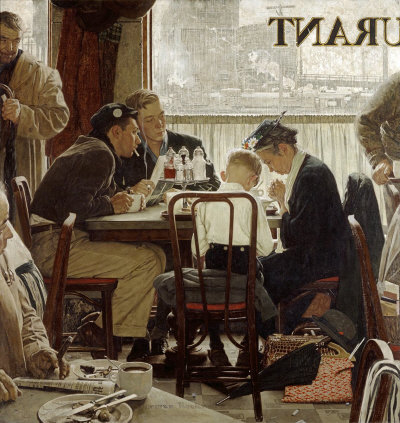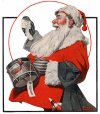 |
||||||||||||||||||||||||||||||||||||||||
Saying Grace by Norman Rockwell
November 24, 1951 Issue of The Saturday Evening PostSaying Grace, a Norman Rockwell painting, appeared on the cover of The Saturday Evening Post published November 24, 1951. This is another timeless favorite of Rockwell collectors, a classic for the ages. This painting was Rockwell's seventh cover for The Post in 1951. In 1951, there were eight Norman Rockwell Saturday Evening Post covers published. This was also Rockwell's 269th cover illustration out of 322 Rockwell painted for the Post. Rockwell's career with the Post spanned 47 years, from his first cover illustration, Boy With Baby Carriage in 1916 to his last, Portrait of John F. Kennedy, in 1963. The original oil on canvas painting, 42 x 40 inches or 106.5 x 104 cm, is part of a private collection. This painting also appears in almost every Rockwell commentary book. It appears:
Two photographs used in composing Saying Grace are reproduced in Norman Rockwell: Behind the Camera by Ron Schick on page 115. The painting itself is also reproduced in that book on page 114. I have seen pristine original copies of this magazine cover sell for big bucks on eBay. And to think it only cost fifteen cents originally! Of course, it was mint condition then, too.
Saying GraceGiclee Prints on Archival Paper: This is a very touching and thoughtful Norman Rockwell paintings. It was also voted the favorite Saturday Evening Post cover of all time by readers of that magazine. It narrowly edged 1954's Breaking Home Ties. Norman Rockwell painted more "serious" illustrations from 1943 on. He still exhibited his famous humor on most of his paintings. Still, as he reached the golden years on his career, he turned to several subjects where humor was not at the forefront, or even present at all. Saying Grace is one such painting. I can find no humor in it at all. The dominant emotion that this painting evokes is reverence. That reverence is not just shown by the grandmother and her grandson. Reverence also exudes from every other character in the diner. That reverence and respect, almost to the point of bordering on a sense of awe, is directed from the other characters to the praying family. Many times in our hustle and bustle world, we forget or neglect to return thanks for our blessings. Sometimes, when we compare ourselves to our neighbors, our own blessings seem pitiably meager. Rockwell seems to allude to such contrasts here as well. Of course, that contrast exists only in our own minds. We are each and every one blessed as the maker has seen fit. To compare our blessings to our neighbors' woud be like comparing apples to oranges, or more accurately, apples to ice cream. The praying woman and boy command both our attention and also that of all the other characters. Are their actions so out of place that it instantly commands such attention? Or is it the way the master storyteller has conveyed the scene? Composing Saying GraceThe scene of Saying Grace is the Horn and Hardart Cafeteria on Juniper Street in Philadelphia, Pennsylvania. The rail yard scene through the window was not visible though the window and was painted from another photograph of a railroad yard. The photograph sessions for the models were conducted in Rockwell's Arlington, Vermont studio. To show his penchant for realism, the table and chairs were borrowed and trucked to Vermont from an Automat in New York City. At least two of the models are known by name, the two young men sitting at the table with the grandmother and little boy. Farthest to the back is Jarvis Rockwell, the artist's oldest son. Closer to us, with darker hair, is Don Winslow, a one time summer intern. Winslow so enjoyed working with Rockwell that he became his apprentice. The model for the older lady passed away before the picture was published. An interesting contrast to the reverence of the characters is seen in the lower left foreground of the painting. Beside the hand holding a cigar is a cup of stale coffee and a saucer used as an ashtray with several butts in it. This miniature still life balances out the earnestness of the rest of the painting. Rockwell painted this scene as if he were the camera, capturing a fleeting moment in these lives just as it unfolded. We viewers feel just as if we were seated at a table in this diner watching this picture as it is made. This painting is one of the reasons that Rockwell is referred as the storyteller with a brush. Saying Grace was only one of 322 Norman Rockwell Saturday Evening Post covers; Here is the list of Norman Rockwell Saturday Evening Post cover illustrations.
Here is the complete list of all Norman Rockwell magazine covers. Though not as popular as 1943's Freedom From Want as a Thanksgiving image, this Norman Rockwell Thanksgiving image is still just as well received today as when it was originally published in 1951. Though from the same era, Saying Grace evokes entirely different moods and emotions from 1943's Thanksgiving: Girl Praying and 1945's Thanksgiving: Mother and Son Peeling Potatoes.
(Image Only) Copyright © 1951 Saturday Evening Post & Curtis Publishing Company
Remember to check back often.
|
Norman Rockwell Quotes:I'll never have enough time to paint all the pictures I'd like to. No man with a conscience can just bat out illustrations. He's got to put all his talent and feeling into them! Some people have been kind enough to call me a fine artist. I've always called myself an illustrator. I'm not sure what the difference is. All I know is that whatever type of work I do, I try to give it my very best. Art has been my life. Right from the beginning, I always strived to capture everything I saw as completely as possible. The secret to so many artists living so long is that every painting is a new adventure. So, you see, they're always looking ahead to something new and exciting. The secret is not to look back. I can take a lot of pats on the back. I love it when I get admiring letters from people. And, of course, I'd love it if the critics would notice me, too. You must first spend some time getting your model to relax. Then you'll get a natural expression. More at BrainyQuote. Thanksgiving Favorites
Holiday Favorites
|
|||||||||||||||||||||||||||||||||||||||
|
|
||||||||||||||||||||||||||||||||||||||||
|
Images are copyrighted by their respective copyright holders. Graphic Files Protected by Digimarc. Contact us for details about using our articles on your website. The only requirements are an acknowledgement and a link.
|
||||||||||||||||||||||||||||||||||||||||






















